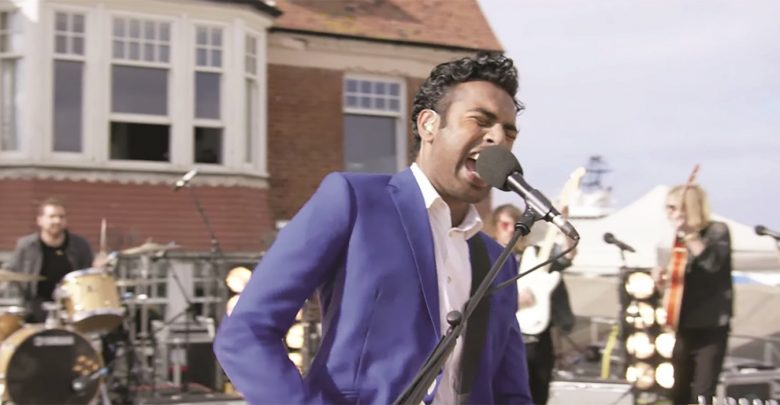
What would the world have been like without the Beatles?
كيف يبدو العالم دون فرقة «البيتلز»؟
Danny Boyle and Richard Curtis’s film, Yesterday, imagines what might have happened if the Fab Four had never existed. Guardian writers and Beatles experts offer their own alternative histories
Alexis Petridis: ‘The 60s wouldn’t have swung so dramatically’
Towards the end of Jon Savage’s masterful book 1966: The Year the Decade Exploded, there’s a telling line from an interview with the Who’s Pete Townshend, surveying the disparate pop scene in December of that year. “It needs the Beatles,” he said, “to sort things out.”
It’s a remark that gets to the heart of the Beatles’ importance. Blessed with exquisite taste and with – in Paul McCartney’s phrase – their “antennae always up”, their albums tied together the various strands of 60s pop into a series of coherent developments. Beatles naysayers point out that a lot of the innovations of the 60s weren’t theirs, that they tended to be sparked by others’ ideas – from Bob Dylan’s lyricism to the Band’s rootsy, back-to-basics approach to the vast debt to black American music that runs through their catalogue – but, aided by the fact that they were just better songwriters and more alive to the possibilities of the studio-as-extra-instrument than anyone else, the Beatles tended to hone those ideas to their point of greatest effect. Pop psychedelia may have fomented at the recording sessions for the Byrds’ Eight Miles High in December 1965, but it found its most potent expression in the records the Beatles released over the next two years. By collating, curating, embellishing and developing, the Beatles gave pop form, they acted as a unifying force.
Perhaps the 60s might have swung without them – 1962 hits including the Crystals’ He’s a Rebel, the Beach Boys’ Surfin’ Safari and the Marvelettes’ Please Mr Postman suggest pop was already in the process of escaping the post-rock’n’roll doldrums before they exploded into the global consciousness – but they wouldn’t have swung so dramatically. Pop wouldn’t have had anything like the cultural impact that it did, it might have remained a series of scattered developments that never coalesced into a world-shaking force. It needed the Beatles to sort things out.
• Alexis Petridis is the Guardian’s chief pop and rock critic.
Peter Doggett: ‘The real rebellions are elsewhere’
Without the Beatles, the beat boom vanishes overnight. After the “electric” riots of 1964, when leather-clad rockers toting solid-body guitars were run off beachfront streets by sharp-suited conservatives, rock’n’roll is buried alongside its quiffs. Pop resumes its natural place as the bastion of teenage dreams, fulfilled by a succession of crooners modelled after Cliff Richard.
Instead, the latent rebellion of 60s youth is focused on folk music. Nothing looks cooler in Soho or the Village than a battered acoustic over the shoulder, scrawled with anti-war slogans. Even Cliff is glimpsed in public with a nylon-stringed guitar, offering gentle condemnations of conflict with a reassuring Christian message. Fourteen-year-old Donny Osmond followed suit, and their Jesus Saves concert in 1971 cements pop’s image as the soundtrack of teenage conformity.
Blues and soul filter into a propulsive new music in black America, but here, too, the folkies leave their mark, as righteous acoustic guitar preachers such as Curtis Mayfield and Jesse Jackson rap out righteous rhetoric over dancefloor rhythms.
And so history unfolds, generational struggles playing out more in words than music, while pop remains defiantly unengaged. Thuggish fascists briefly fuel an unwelcome late-70s revival of electric rock, but this anachronistic gesture from self-dubbed “punks” is quickly squashed. The real rebellions are elsewhere – in fashion, art, folk music and poetry – and none of them impinge on pop.
A new century demanded change, and superstars who could blend clean-cut teen appeal, acoustic gentility and sanitised African American rhythms. In 2019 we worship them still: George Michael, Ed Sheeran and, paragon beyond compare, the preternaturally youthful Cliff Richard.
• Peter Doggett is the author of You Never Give Me Your Money: The Battle for the Soul of the Beatles, published by Vintage.
Kitty Empire: ‘Surfing and skateboarding might have become pop’
In 1966, John Lennon quipped that the Beatles were “more popular than Jesus”, causing uproar in the Bible belt and beyond. But what if there had been no Beatles? The Stones might not have been Christlike in their reach. You might argue that, without the lovable mop tops as a vector, there might have been no global pop culture phenomenon, no monster western lifestyle export. If pop had never achieved this hegemonic Beatle moment, it might never have transcended its niche role as mere song: something to record popular memory (folk) or to dance to. Pop would never have become all synecdochally involved with notions of freedom, of sexual liberation, with the counterculture, sitars and yoga. No British Invasion. Pop would have stayed mere background noise: some tunes, parochially limited.
What other forms might have become pop – the pop cultural phenomenon – if pop hadn’t been pop? Surfing and skateboarding might have very easily done it – rebellious, individualistic western tropes with low entry requirements (skateboards being cheaper than electric guitars), unlimited long-haired pinups to idolise, the scurf of wheels on concrete standing in for the guitar solo. There could be Hard Surf Cafes the world over.
Gaming – pop’s 21st-century analogue – was still merely a glimmer in a techie’s synapses. But of all the cold war pastimes – collecting baseball cards, darts – perhaps chess might have fitted the crossover bill. Imagine a counterfactual world in which chess players have become idols, their styles and stratagems fawned over by lesser players through cover versions, advocating not peace and love through bed-ins but war by another means.
All the pastimes that might have gone viral lack the portability, directness and intimate reach of sound, though. Jazz really would have filled’s pop’s boots. Imagine from Manchester to Melbourne via Mombasa and Moscow, everyone worshipping the saxophone instead of the electric guitar. With Miles Davis’s Kind of Blue the bestselling jazz album of the 60s, it’s not hard to picture Milesmania rather than Beatlemania, or teenagers fainting from Coltrane psychosis. Jazz ticks the boxes for sharp looks, parental bafflement, underground bone fides and all-important cool (a jazz coining, originally). Or it might have been the pop-jazz of Georgie Fame and the Blue Flames that triumphed. Who knows?
• Kitty Empire is the Observer’s pop and rock critic.
Ken McNab: ‘Mick Jagger would be working in the City’
A world without the Beatles would be the equivalent of Leonardo never picking up a paintbrush or Shakespeare concluding that Hamlet amounted to vacuous doggerel. They really do inhabit that rarefied atmosphere reserved for history’s most treasured cultural artisans. If they hadn’t formed, someone would have had to invent them as an antidote to the mundanity of millions of lives.
Without them, who would have generated the momentum for their contemporaries? It’s likely Mick Jagger would have been working in the higher echelons of the City while dabbling on the fringes of politics; Keith Richards would maybe have dedicated a nomadic life to working as an addiction therapist. Elton John and Billy Joel would be playing Frank Sinatra and Perry Como covers in downtown bars while Liam and Noel Gallagher could have ended up behind bars, victims of their misspent youth.
If he hadn’t met Lennon, McCartney could have become an English teacher who dabbled in songwriting on the side, specialising in songs about animals – blackbirds, raccoons and old English sheepdogs. Lennon could have been a busker outside a barber’s shop in Liverpool’s Penny Lane, eventually drifting into the world of advertising jingles with Give Peas a Chance. Their paths never cross until old age, when they become members of the local bowling club, and go down a storm at club functions.
• Ken McNab is author of And in the End: The Last Days of the Beatles, published by Birlinn/Polygon.
Jude Rogers: ‘Brian Epstein went back to the theatre. He’d always regretted leaving Rada’
Brian Epstein sits in his Belgravia flat and looks back on his life. He often thinks what would have happened if he’d never gone to the Cavern. He would have kept the record shop going, perhaps. Maybe opened a few more. But the Hollies did well out of him – they had some great tours – as did Cilla, whose Memphis album he was proud of. (He’d pushed her to do that.) But he’d always wanted an act with more charisma, like the Rolling Stones, to get his teeth into. He’d never quite found it. The thought plagues him sometimes, then it drifts away.
Leaving his family for London had made life easier. Then came the change in the law. He worked on music’s fringes for a while, though the blues-rock ubiquitous in Britain in the 60s really wasn’t his thing. He went back to the theatre (he’d always regretted leaving Rada) and built his teenage love of fashion into a career in costume design. It had gone well enough – men were much better dressed in repertory if he was involved – although he doubts he’ll be remembered after he dies.
The other day, a girl who remembered him from the shop, Cynthia Powell, bumped into him in a restaurant in the West End. They laughed about their nights at the Cavern; she’d married a Liverpool lad, and become an artist herself. It’s funny how that time gets forgotten, she said – Liverpool’s a shadow of itself now. Brian Epstein sits back, puts an old record on, and remembers a simpler time.
• Jude Rogers is a Guardian music writer.
• Yesterday is released on 28 June.
source: theguardian.com
فرضية مثيرة يثيرها فيلم «الأمس»، الذي يُعرض بصالات السينما هذا الأسبوع، تقول: «كيف يبدو العالم بدون فرقة «البيتلز» أو أغانيهم الشهيرة؟».. ماذا لو نسيت الجماهير كل شيء عن جون، وبول، وجورج ورينغو؟ يدرك أحد المطربين المكافحين أنه الشخص الوحيد على الأرض الذي يتذكر فرقة «البيتلز» التي كتبت وغنّت العديد من أعظم الأغاني في كل العصور.
الأمس YESTERDAY
النوع: كوميديا، موسيقي
الزمن: 116دقيقة
البطولة: هاميش باتل، للي جيمس
الإخراج: داني بويل
التصنيف: R
كوميديا موسيقية بريطانية أنيقة من «يونيفرسال بيكتشرز»، عرض في الحفل الختامي لمهرجان ترايبيكا السينمائي الدولي في 4 مايو الماضي، ونال مراجعات إيجابية من كتّاب ونقّاد السينما (%68). تتمحور أحداث الفيلم حول جاك ماليك (هاميش) الذي يستعيد وعيه في أعقاب حادث مروري ليجد نفسه يعيش في عالم لا يعرف ولم يسمع عن فرقة «البيتلز» أو أغانيهم الشهيرة، ويتصور نفسه الشخص الوحيد الذي يتذكر فرقة الخناس «THE BEATLES».
الفيلم من إخراج الإنجليزي داني بويل (1956) صاحب فيلم «المليونير المتشرد» 2009، ستيف جوبز 2015. قال (بويل)
لـ «الجارديان»: هذا ليس فيلماً عن السفر عبر الزمن، لكنه يبدو وكأنه تقديم موسيقى البيتلز إلى أميركا للمرة الأولى. كتب قصة الفيلم ريتشارد كورتيس «نوتنغ هيل»، ويلعب بطولته الإنجليزي هيمش باتل (1990) ونجمة فيلم سندريلا للي جيمس (1989).
آنا ANNA
النوع: أكشن
الزمن: 119 دقيقة
البطولة: ساشا لوس، لوك إيفانز
الإخراج: لوك بيسون
التصنيف: R
فيلم أكشن فرنسي من «يوركروب» (30 مليون دولار)، كتب قصته وأخرجه لوك بيسون (1959) -أحد أشهر صنّاع السينما الفرنسيين في العقود الثلاثة الأخيرة، والذي كرّس مسيرته ليبرهن أن الأفلام الفرنسية يمكن أن تقف نداً لهوليوود مع قائمة ضخمة من أفلام الحركة أخرجها بنفسه أو أنتجتها شركته «يورباكورب» (لوسي، ليون، العنصر الخامس، نيكيتا، جان دارك، ترانسبوتر) وغيرها.
تتمحور قصة الفيلم حول فتاة شابة من النخبة السوفيتية (كي جبي بي)، تتحول إلى قاتلة لا تعرف الرحمة. الفيلم من بطولة الروسية ساشا لوس (1992)، والممثل الويلزي جورج إيفانز (1979)، والمخضرمة البريطانية هيلين ميرين (1954).
المادة 15 ARTICLE 15
النوع: دراما
الزمن: 130 دقيقة
البطولة: أيوشمان خورانا،
ساياني غوبتا
الإخراج: أنوبهاف سينها
التصنيف: R
فيلم دراما وجريمة من بوليوود من «استوديوهات زي»، يستند إلى قصة حقيقية، تم عرضه في حفل الافتتاح في مهرجان الفيلم لندن للفيلم الهندي (LONDON INDIAN F. F) في 20 يونيو الحالي، وينزل في صالات السينما الهندية والعالمية في 28 يونيو. تتمحور حبكته حول التمييز الطبقي السائد داخل المجتمع الهندي (يشير عنوان الفيلم إلى المادة 15 من الدستور الهندي التي تحظر التمييز على أساس الدين، العرق، الطبقة أو الجنس).
ويتابع الفيلم ضابطاً شرطياً حديث التخريج يسعي إلى الكشف عن اختفاء ثلاث فتيات في ظروف غامضة.
الفيلم من إخراج الهندي أنوبهاف سينما (1965، الذي اأشتهر بفيلم «ملك» (MULK).
أنابيل تعود للديار ANNABELLE COMES HOME
النوع: رعب
الزمن: 106 دقائق
البطولة: ماكينا غريس،
ماديسون إيسمان
الإخراج: غاري دوبيرمان
التصنيف: R (18 +)
فيلم رعب خارق من «وارنر بيكتشرز» و«نيولاين سينما»، وتتمة لأفلام «أنابيل» (2014) و«أنابيل كرييشن» (2017)، والجزء الخامس من سلسلة أفلام الرعب الشهيرة الشعوذة (The Conjuring Universe) التي انطلقت عام 2013 وحققت (1.690 مليار دولار) في شباك التذاكر.
وتتمحور حول دمية مسكونة، وهي واحدة من تلك الدمي الفيكتورية المرعبة. الفيلم من إخراج غاري دوبيرمان، وهو كاتب سيناريوهات معروف في أول ظهور له في مجال إخراج الأفلام.
عودة حنا للديار HANNA`S HOME COMING
النوع: دراما، غموض
الزمن: 98 دقيقة
البطولة: ماكسمليان بيك،
سيمون جيبلر
الإخراج: إيزر بيلاس
التصنيف: R
فيلم إثارة وغموض من السينما الألمانية بعنوان ثاني «حيث لا يسقط الظل»، يتابع قصة فتاة شابة تُدعى حنا، وهي في الرابعة عشر من عمرها تعود إلى بلدتها أثناء العطلة الصيفية لمساعدة والدها في إدارة محل الجزارة الخاص بالأسرة، وسرعان ما تكتشف أنها غير مرحب بها من قِبل أهالي البلدة الذين ربطوا وجودها بحادثة مروّعة تقول الشائعات إن وراءها والدتها التي اختفت في ظروف غامضة دون أي أثر بصحبة ثلاثة من رجال القرية.
وللغرابة يتزامن وجودها مع ظهور أشياء غريبة مثل اختفاء بعض الأفراد والحيوانات.



